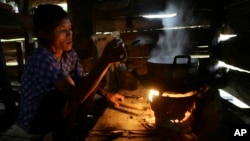Eighteen families in a remote region of Koh Kong province have been ordered to move, in order to make way for the development of a Chinese-funded luxury tourist outpost. The families received notice on June 5, ordering them to leave their homes within one month. Authorities say they are living on the land illegally.
In Kongchet, Koh Kong coordinator for the rights group Licadho, said the families were displaced after the Khmer Rouge folded and integrated into the government, between 1996 and 1997. They were already removed from another location, in 2011, he said. Chinese development in the area also includes construction of a reservoir and hydropower project, from the Union Development Group.
“The provincial environment department issued a letter ordering the 18 families to quickly remove their homes within one month, from a location where they are currently growing crops, in the Damnak Krobey area, in Prek Smach, Koh Sdech commune, Kiri Sakor district, because this land was the land which was cut out from Botum Sakor National Park,” In Kongchet said. “They are worried, and they want to live and manage this in order to do farming because they don’t have any other land to farm.”
The Union Development Group received an economic concession totaling 45,100 hectares from the government in 2008, to build a $3.8 billion tourist enclave. The project is now under way in the middle of Koh Kong’s Botum Sakor National Park.
Village representative Srey Sopha, 35, said people want to keep living on the land, because they can’t find a new location. “The environment officials said, ‘You can’t live here, because the government has leased this place to Union Development,’” she said. “Where shall we go? We don’t have homes.”
She acknowledged that villagers had cleared forest to plant crops. “I accept that. We are poor and have no land and no homes. We accept that we are clearing the land, with sweat and blood, without machines. We used our hands.”
Morn Phalla, an official with the Kong Kong provincial administration, said villagers had moved onto the land in March. He defended the government’s decision to lease land to Union Development, which could not be reached for comment.
“It’s a government principal,” he said. “We need investment to develop the national economy.”








